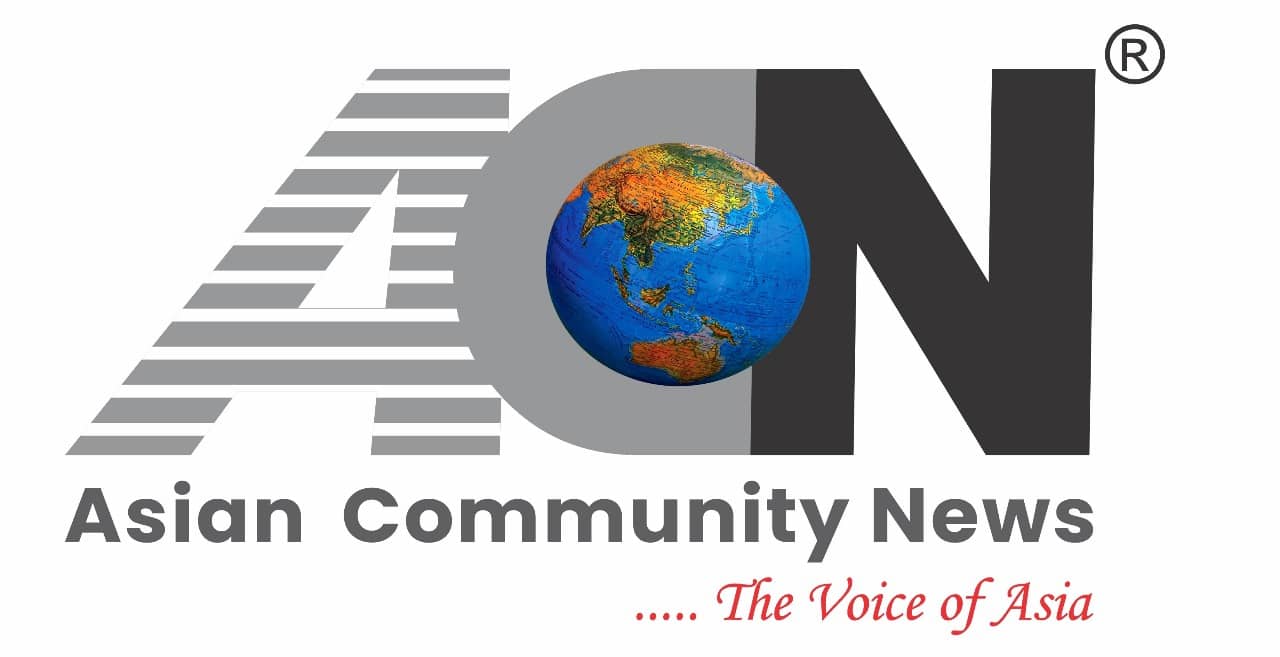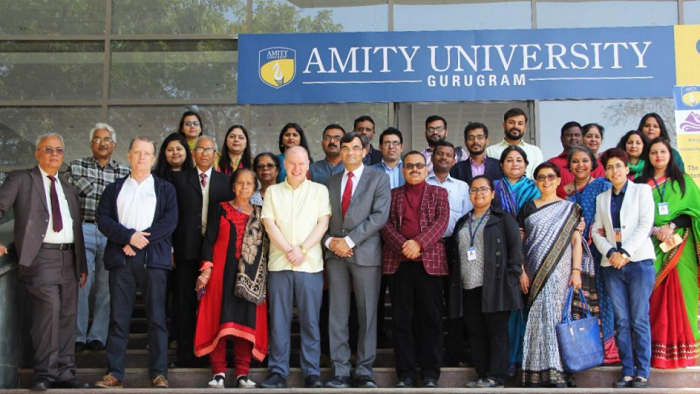As the danger of several languages spoken by marginalized speech communities shrinking in their bases looms large, the top-notch thinkers from universities across India and from the University of Highlands & Islands (UHI), Scotland, UK put their heads together recently to devise a solution to address this crucial issue.
For this, a two-day colloquium on ‘Mediating Multilingualism’ (MM) was organized by Amity School of Communication (ASCO) and Amity School for Linguistic Studies (ACLiS), Amity University Haryana on March 18-19 at its Manesar campus.
The colloquium was a part of the collaborative pilot project for language revival between Amity University Haryana (AUH) and the University of Highlands & Islands (UHI), Scotland, UK.
At the MM-forum, the discussions emphasized the need to prepare a Video-Ethnography of marginalized speech communities focusing especially on the Indian context based on earlier work done in Scotland and Ireland. The whole colloquium revolved around the need to protect and save the endangered languages of India as well as in the UK.
“The Video-Ethnography of marginalized speech communities will be shared with our counterparts in University of Highlands & Islands (UHI), Scotland. We will see what they have done in the UK and how is it comparable with what we are doing here. It will also be published as a volume,” Prof. (Dr.) Udaya Narayana Singh told Asian Community News (CAN) Network.
Prof. (Dr.) Udaya Narayana Singh is Dean, Faculty of Arts & Chair Professor, Amity Centre for Linguistic Studies (ACLiS).
Prof. (Dr.) Singh and Professor Conchúr Ó Giollagáin, Director, SOILLSE are the leaders of the present pilot project.
The event took off with the initial remarks of Prof. (Dr.) Udaya Narayana Singh giving details on the UNESCO World Atlas on Languages facing Endangerment, and how interest in such speech communities began in India.
Professor P.B. Sharma, Vice-Chancellor, AUH, honoured the two Scottish and Irish guests Professors Conchur and Gordon Wells from University of Highlands & Islands, UK.
With the welcome address day one session began with the experiences and problems in order to improve upon the theoretical bases and methodologies with presentations by research groups followed by open-house discussion among scholars in Communication, Culture Studies, Social Anthropology and Linguistics.
Prof. P.B. Sharma talked about multi-cultural communities in India, the importance of video-ethnography, multilingualism, and opined that India’s diversity must always be maintained but not at the cost of her unity.
In the inaugural keynote, Prof Conchur described the background of eight Scottish and Irish universities that formed SOILLSE Network, and how it has attempted to work for the revival of Gaelic.
Day one speakers include Dr. Atanu Sha (Jadavpur University, Kolkata) who talked about the challenges in documenting linguistic diversity, the less studied languages of West Bengal where he focused much on Language Vitality and Language Documentation. As a matter of preparation, the role of software like FLEX, ELANand DSpace repository etc was emphasized. He provided copious examples of how new facts came up in the languages studied under the CFEL Project at Jadavpur.
Professor Madhumita Borbora (Tezpur University) shared the impact of Multilingualism in the lesser-known languages of North East India, where she emphasized on scheduled and non-scheduled languages of Nagaland, Manipur and Arunachal Pradesh. She described the Arunachali Hindi in the light of the ‘Three Language Formula’ as implemented there.
After her description of the seven grammatical treatises produced by CFEL, Tezpur University, the participants were enriched by the description of ‘Island Voices: Language Capture and Curation Project’ as described by Gordon Wells, a linguist and Project Manager of Soillse Network, UHI. Here, he shared the results of surveys in and documentation of Gaelic language skills, a few hundred different ethnographic videos on YouTube, the dictionary software – Clillstore and WordPress version of the oral interviews with English translations. Prof Sanjay Kumar Jha, Director, ASLA chaired the session.
Session three of Day one was fully dedicated to Indian speakers and languages.
Professor Shailendra Kr Singh (NEHU, Shillong) talked about developing and promoting smaller languages in Meghalaya and Mizoram where he compared the languages and population as well as unclassified languages and the status of Indo-Aryan languages among the Tibeto-Burman speech communities.
Dr. Pushpa Renu Bhattacharya (Tezpur University) gave a brief survey of socio-linguistic pattern of Khelma in relation to the mediating role of the multilingualism among the native speakers. She talked about Khelma, Hanle & Hante, Sakachep and expressed her concern about their dilemma to learn their own language. Dr. Arimardan Kr Tripathy (CFEL, Visva-Bharti, Santiniketan) gave his presentation on measuring linguistic endangerment in India in a parametric manner, where the main focus was on the marginal language issues, including limited government support and existence of culturally rich but widely isolated languages. He showed his concern as to why the young generation was “leaving” their languages? There was a long discussion in which several scholars participated and exchanged views on the causes and concerns of language endangerment, and on how much intervention was needed and possible.
This session was chaired by Prof Hemant Kumar Jha (Professor, ASLA, AUH).
Day one ended with one more session, chaired by Dr Pooja Rana (ASCO, AUH) and with her introductory and concluding remarks after the screening of the documentary on – ‘The Toto’ of North Bengal, produced by the CIIL, Mysore in 2007 under the design and guidance of Prof Udaya Narayana Singh, the then Director of the Institute. A discussion ensued as to the status of Totos as studied by Jadavpur University in 2017. It was followed by a presentation on the Issues of language documentation through a joint paper by Ms Esha Jainiti (Dy Director, ASCO, AUH) and Prof Udaya Narayana Singh (Dean, Arts & Director, ASCO) where they pointed out there was always an artistic side to audio-visual recording, as exemplified by the documentary as well as through the attempts of the women in Peru to preserve their traditional knowledge system.
Day two sessions, chaired by Dr Rupendra Guha Mazumder (Dept of English, University of Delhi), emphasized on the issue of smaller languages and the much-needed development activities to infuse new life to them. It opened with a talk by Dr. S. Thennarasu (CFEL, Central University of Kerala) on the status of endangered languages of Tamil Nadu, while Dr G. Palanirajan (CFEL, Central University of Kerala) shared Kerala’s endangered languages project and its overview including compilation of dictionary in eight languages by different scholars involved in their programme.
After the presentation of each and every paper, an open-house discussion was conducted so that participants, as well as scholars, could share their observations as well as discuss the ideas on video ethnography. Zamark Shinwari (Nangarhar University & AUH) and Prof Udaya Narayana Singh (AUH) shared a profile of selected Indic endangered languages in Afghanistan in the colloquium, followed by two more detailed presentations by Professors Conchur on the methodology used in SOILLSE Project as well as documentation methods by Gordon Wells.
Lastly, there was screening of a documentary on “Lepchas of Bengal” made by CIIL with a generous introduction to the Bhasha Mandakini project given by Prof Udaya Narayana Singh, under which 680 such films were made in four cultural spaces – Bengal, Maharashtra, Karnataka and Tamil Nadu. A rich discussion followed the screening which shaped the whole colloquium thinking about the current scenario of endangered languages of India.
The last session was chaired by Dr Savita Khan (Dept of History, University of Delhi) where Dr Prasannanshu (National Law University, Delhi) gave a detailed discourse on language endangerment and legal issues. How the constitutional policies work for the revival and survival of languages was the focus of discussion soon after. This was followed by a very lively session on all issues connected with language and cultural integration and disintegration.
Winding up and Vote of Thanks was given by Professor Udaya Narayan Singh thanking the guests Conchur & Gordon Wells from University of Highlands & Islands, UK, and all other research groups that came from different parts of India.
This colloquium is surely an assurance for a long term friendship between India and Scotland and many successful projects coming soon under the supervision of the leaders like Professor Udaya Narayan Singh, Conchur & Gordon Wells. The visiting scholars were presented with a rich memento each by the Director, ASCO. All participants and paper-readers were given Certificates of Attendance soon after.
Mediating Multilingualism could provide a model to enhance both confidence and competence among the members of such speech communities thus contributing to the evolution of their vision, creativity, skills and desire to engage in intercultural communication. This could be one of the ways in which endangered languages and culture-groups could establish their identity and ark their space in a multilingual landscape.


